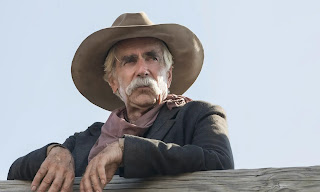Yellowstone fans who’ve wondered why, exactly, the Dutton clan are such an ornery bunch are about to discover what therapists have been trying to tell us about our own dysfunction for years: It’s all in the family origin story. Now Taylor Sheridan hand delivers the Dutton’s beginnings on horseback in 1883, a desolate prequel premiering December 19 on Paramount+. The show follows their ancestral rise to cattle ranch power as they make the hardscrabble journey from the South to Montana. Strap down your Stetson, ’cause it’s a grim, bumpy ride—one so dark at times it threatens to overshadow even the most golden sweeping sunsets on those untamed Great Plains.
1883 promises a tale of the Dutton ancestors fleeing a life of poverty for the promised land of Montana. Country stars Tim McGraw and Faith Hill take the leads, playing great-grandfather John Dutton and wife Margaret, with eldest daughter Elsa (Isabel May) and 5-year old John (Rick Audie) in tow—we’ve already met the latter as the future Dutton Sr. (Dabney Coleman) in Yellowstone’s second season. There’s ample evidence Sheridan intends to ground the show in historical accuracy, too.
HWD Daily & Awards Insider
Stars, studios, streamers, and scandals. Plus, a weekly dose of must-read awards coverage.
In the three episodes provided to critics, we learn John is rendezvousing in Texas with the rest of his family, who arrive from Tennessee on 1882’s just-completed Texas Pacific Railway. McGraw’s no-nonsense brevity and soft heart echoes the scrappier beginnings of Kevin Costner’s Dutton, while Margaret recalls the stern pioneer spirit of Yellowstone matriarch Evelyn (Gretchen Mol). Elsa’s unladylike wanderlust and riding skills suggest an earlier incarnation of Yellowstone’s Beth (Kelly Reilly), too; both of them were raised more like boys, and have the kind of tense relationships with their mothers that suggest strong-willed hardness is indeed inherited.
The opening scene of the pilot flashes forward to an unidentified moment, showing narrator Elsa struggling to process a scene of fiery destruction, her wagon smoking with flames behind her. “Ah remember the first time Ah saw it,” she tells us in a Plantation Southern drawl full of semi-poetic observations. “Ah tried to find words to describe it. But ah couldn’t. Nothin’ had prepared me.”
When the camera pans out to reveal a mid-conflict clash with the local Native tribe that doesn’t look much in the travelers’ favor, she reaches for a pistol, then asks one tribesman if he’ll let her go. “I will sell you,” he says curtly. “Or I will kill you.”
“You speak English,” she says, desperately. “How can you do this?”
“You speak English,” he replies. “And all your people do this.”
“If this is hell and Ahm in it,” Elsa’s narration returns, “then Ah must be a demon, too.”
Sheridan once told the New York Times that he writes not just for red-state viewers, but to “show you all sides.” Much like Yellowstone, with its thorny juxtapositions of motive in the Montana land tussle, 1883 fulfills this promise. From the first moment, viewers will wonder whether the Native Americans are violent aggressors or rightfully defending their land (or both). Likewise, are these white and newcomer European immigrants courageous adventurers, or disease-spreading, greedy interlopers (or both)?
Before the excruciating journey begins, desperate characters make ill-informed preparations for their trip in the historically turbulent patch of Fort Worth called Hell’s Half Acre. There, the ancestral Duttons meet Shea Brennan (Sam Elliott), a Pinkerton agent who’s agreed to lead a horde of migrants for a sum. Elliott’s Brennan has the grieving resignation of someone with nothing to lose, and nothing better to do than glimpse the promised land himself before it’s spoiled by the very settlers he’s guiding. Brennan’s partner and friend Thomas (LaMonica Garrett) is a Black agent for the Pinkertons whose stoic patience delivers the sort of carefully calculated reserve a freedman in the era’s survival would depend on. (The Pinkerton Detective Agency, led by the staunch abolitionist Allan Pinkerton, is believed to have hired the first Black and female agents, and had long relied on slave intel to work against the Confederacy.)
Brennan spends most of his time in deeply sad, gruff, no-bullshit mode, reminding the trail noobs that just about everything is capable of killing these fools—especially because they have neither horses nor guns, much less any idea of the numerous deadly threats ahead. No matter how many times he barks at them to boil the river water before drinking it, watch for rattlesnakes, or avoid trails full of bandits lying in wait, they go down with one merciless death after the next.
Fort Worth’s notoriously corrupt lawman Jim Courtright is played here with chilling amoral indifference by Billy Bob Thornton. Likewise, we meet what appears to be Union General George Meade (Tom Hanks) in a flashback to Antietam, the bloodiest battle of the Civil War. We see that Dutton was a Confederate soldier on the wrong side of history. As he weeps, surveying a battlefield of total decimation, he’s comforted silently by Meade. Elsa’s narration informs us that Dutton would spend three years in a Union prison, and refuse any association with the Confederacy again. (Sheridan has said to expect more surprise star appearances from the series.)


0 Comments